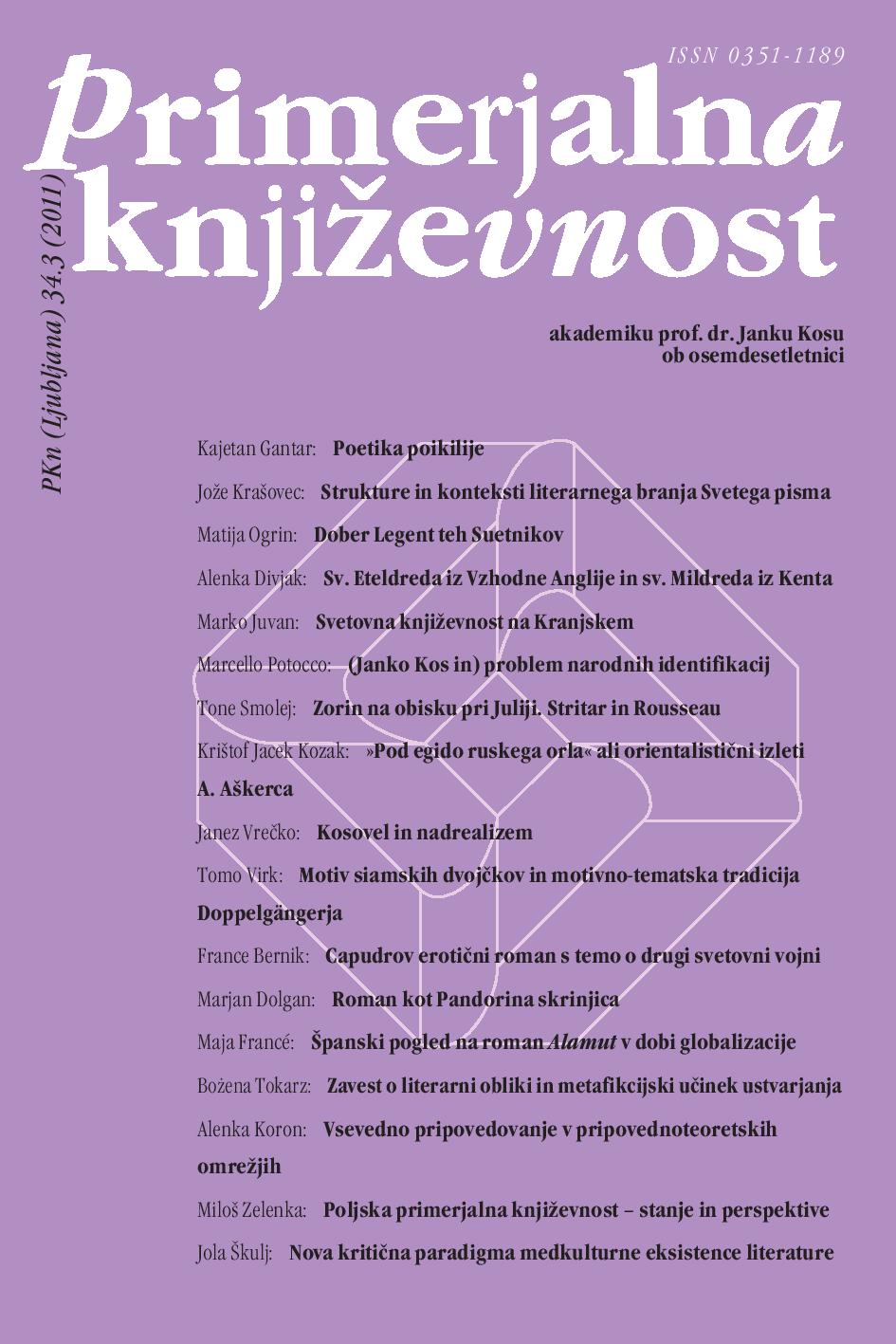Structures and Contexts of Literary Reading of the Bible
Keywords:
the Bible, biblical literature, comparative reading, semantics, stylistics, literary and cultural contextsAbstract
Biblical literature includes various genres or types that are similar in many respects to the literary pieces produced by Near Eastern and Greco-Roman antiquity. Behind the final forms of literary types and styles lies the oral stage transmitted by tradition. Ancient Israel stepped into an inter-oriental literary tradition with fixed types and styles, and therefore most Israelite literature has close parallels in much older oriental literature. The thought-rhyme (parallelismus membrorum) is fundamental in Hebrew poetry as a stylistic phenomenon, although it is already found in Ugaritic poetry. The Old Testament concepts, images, turns of phrase, and deliberate quotations are visible testimony of how profoundly the Old Testament influenced the life and thought of primitive Christianity. Traditional hermeneutics in the past concerned itself with comparisons in connection with non-Biblical texts and left open the question of the Bible’s historical and religious uniqueness. When literature was linked with language and history in one common study, it was inevitable that the historical element in literature should become prominent. In the broader field of independent literary study, the historical side of literature falls into the background. – This article examines the fundamental forms of Biblical literature in the spirit of comparative literature. The main issue is the question of how specific Biblical values concerning the concepts of God and humans form characters in which delicacy and reserve are supreme. Biblical literature is dominated by an utter passion for righteousness and ideas of purity, infinite good, universal order, and faith in the inevitable downfall of all moral evil. It is striking that the basic theological maxims did not change with the transmutation of traditions. Because a variety of material ranging from ancient myths, folk tales, legends, history, and prophetic oracles to hymns and laments – to mention only a few genres – was incorporated into Biblical documents, the theological maxims became even more unified. It is true, however, that the textual formulations often remained ambiguous, problematic, or incomplete. Nevertheless, the themes and forms of the Bible show a clear tendency toward sublimity and universalism. The central axis of the Bible is the personal relationship with God. The central focus of the Bible became a personal experience and the general domain of the human ethical relationship to God was extended to include all basic theological questions – extended, in fact, to cover all the concerns of life itself. The capacity to grasp transcendental and moral truth does not necessarily imply the creation of one ultimate, universal, and all-embracing unified conceptual scheme, but rather a harmonious association of many schemes coordinated by a common system. The harmonious interlocking of individual schemes provides an internal consistency for the organic structure of literary texts. The greatness of the Biblical poets arises from the fact that their subject is the divine mind and they reveal a depth of true understanding that all people of good will consciously or unconsciously aim to achieve.References
Abraham, William J. Canon and Criterion in Christian Theology: From the Fathers to Feminism. Oxford: Clarendon Press, 1998.
Alter, Robert in Frank Kermode, ur. The Literary Guide to the Bible. London: Collins. 1987.
Avsenik Nabergoj, Irena. Hrepenenje in skušnjava v svetu literature: Motiv Lepe Vide. Ljubljana: Mladinska knjiga, 2010. (Kultura). Prva verzija v angleščini (2009).
– – –. Literarne vrste in zvrsti: Stari Izrael, grško-rimska antika in Evropa. Ljubljana: Cankarjeva založba, 2011.
Barr, James. The Semantics of Biblical Language. Oxford: Oxford University Press, 1961.
Cassuto, Umberto. The Goddess Anath: Canaanite Epics of the Patriarchal Age. Iz hebrejščine prevedel Israel Abrahams. Jeruzalem: Magnes Press, Hebrew University, 1971.
Chateaubriand, François-René de. Génie du christianisme ou beautés de la religion chrétienne. Uredil Maurice Regard. Pariz: Éditions Gallimard, 1978. (Bibliothèque de la Pléiade).
Fewell, Dann Nolan, ur. Reading Between Texts: Intertextuality and the Hebrew Bible. Louisville, KY: Westminster/John Knox, 1992.
Fisher, Loren R. Ras Shamra Parallels, I–III. Roma: Pontificium Institutum Biblicum, 1972–1981. (Analecta Orientalia 49–51).
Gabel, John B., Charles B. Wheeler in Anthony D. York. The Bible as Literature: An Introduction. New York/Oxford: Oxford University Press, 1986, 1996.
Harris, Scott L. Proverbs 1–9: A Study of Inner-Biblical Interpretation. Atlanta, GA: Scholars Press, 1996.
Jasper, David in Stephen Brickett, ur. The Bible and Literature: A Reader. Oxford/Malden, MA/Carlton: Blackwell, 1999.
Krašovec, Jože. Der Merismus im Biblisch-Hebräischen und Nordwestsemitischen. Rim: Biblical Institute Press, 1977. (Biblica et Orientalia 33).
– – –. Antithetic Structure in Biblical Hebrew Poetry. Leiden: E. J. Brill, 1984. (Supplements to Vetus Testamentum 35).
– – –. Pravičnost v Svetem pismu in evropski kulturi. Celje: Mohorjeva družba, 1998. Tudi francoska izdaja (1988).
– – –. Nagrada, kazen in odpuščanje: Mišljenje in verovanje starega Izraela v luči grških in sodobnih pogledov. Ljubljana: SAZU, 1999. (Dela 53).Tudi angleška izdaja (1999).
Mayes, Andrew David Hastings, ur. Text in Context: Essays by Members of the Society for Old Testament Study. Oxford: Oxford University Press, 2000.
Norton, David. A History of the Bible as Literature, I–II. Cambridge: Cambridge University Press, 1993.
Parker, Simon B. The Pre-Biblical Narrative Tradition: Essays on the Ugaritic Poems Keret and Aqhat. Atlanta, GA: Scholars Press, 1989.
Snoj, Vid. Nova zaveza in slovenska literatura. Ljubljana: Založba ZRC, ZRC SAZU, 2005. (Studia litteraria).
Sveto pismo: Nova zaveza in Psalmi. Jeruzalemska izdaja. Ur. Jože Krašovec. Ljubljana: Teološka fakulteta/Družina, 2010.
Wright, Terry R. The Genesis of Fiction: Modern Novelists as Biblical Interpreters. Aldershot/Barlington, VT: Ashgate, 2007.


